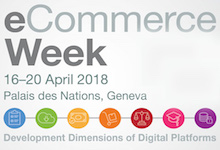Emerging B2B market platforms: Spotlight on trade in services
18 Apr 2018 10:00h - 11:30h
Event report
[Read more session reports from the UNCTAD E-Commerce Week 2018]
This session explored how online business-to-business (B2B) marketplaces can facilitate trade in services, and the opportunities and challenges they encounter in promoting such trade. Moderator Ms Lee Tuthill (Counsellor, Trade in Services & Investment Division, World Trade Organization) explained that both B2B and e-commerce in services are topics that lack attention, not least as they are difficult to measure, while they both constitute increasingly important elements of the digital economy.
Mr Brijesh Agrawal and Mr Dinesh Agarwal (Co-founders, IndiaMART) gave an insight into India’s B2B services, which is still a fairly new sector in the country’s economy. IndiaMART attempts to facilitate such trade by connecting sellers and consumers of services – ranging from technicians to accountants and human resource specialists – on their online marketplace. Compared to the online trade in goods, there are important challenges for e-commerce in services, especially considering the lack of standardised offerings: the same product is often sold differently, depending on the needs of the customer. In addition, there is a general lack of quality and consistency in the services that are offered, not least due to a lack of skilled manpower on the supply side, leading to a mistrust on the part of the consumers which prevents them from buying services online. They furthermore emphasised that the services sector will only expand with the robotisation of production, driving more and more people into the services sector: software services in particular could benefit from this development.
Ms Anna Nesterova (Chairwoman, Board of Directors, Global Rus Trade) explained how her company provides global cross-border e-commerce, including in B2B services. She highlighted the central role of trust in this area, which is needed for buyers and sellers to build sustainable relations. Global Rus Trade supports this process by providing expertise alongside the transaction and by verifying all companies that want to register with the platform. She also underscored the potential of cooperation across platforms, as each platform has its own specialisation, and the creation of common standards and exchanging of experience to improve the effectiveness of online marketplaces across the world.
Mr Giles Derrington (Head of Policy, techUK) identified three areas of potential growth for B2B e-commerce in services:
- The shift away from hardware into software services (e.g. storing data in the cloud)
- The emergence of new technologies, such as 3D printing, which can change the way in which goods flow across borders
- Virtual reality and augmented reality, which shape the nature of service delivery as they can allow people to see what something will look like before it has been constructed
Derrington furthermore emphasised the need for basic digitalisation of small businesses, as this is still a major barrier, requiring technical expertise that is often expensive to obtain. This digitalisation calls for capacity building and education, to develop the skills needed for the digital economy.
Mr Dylan Piatti (Chairman of the Board, Ecommerce Forum Africa, and Senior Chief of Staff, Deloitte Africa) explained that B2B business is often underestimated, due to a general lack of data in this area. In addition, the digitalisation of business has become so commonplace that consumers and organisations often do not even realise that they are conducting digital transactions, for example through e-banking or arranging travel logistics. There is a misperception that digitalisation is an ‘add on’, while it rather needs to be seen as part of a re-engineered business model.
During the discussion that followed, a question was raised on how to drive traffic and get users to come to online platforms. D. Agarwal explained that this requires considerable effort in networking and providing incentives for those who use the platform, as well as making sure that the platform has an intuitive design. Nesterova explained that, on the demand side, user misperceptions about e-commerce need to be addressed, so that they see the benefits of doing business online.
Piatti raised the question of the utility of digital contracts, which still has a rather low adoption rate. D. Agarwal explained that service contracts are more difficult to produce electronically, as many services are personalised and customised. Derrington added that trust is absolutely key and cannot be created only by signing a contract.
By Barbara Rosen Jacobson
Related topics
Related event

